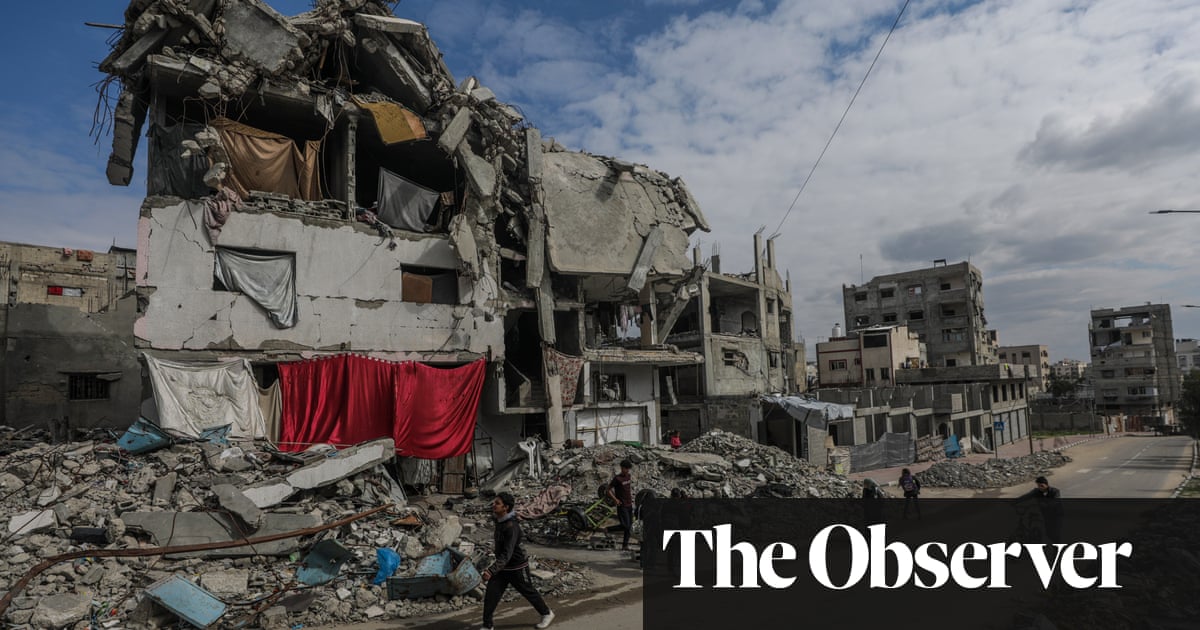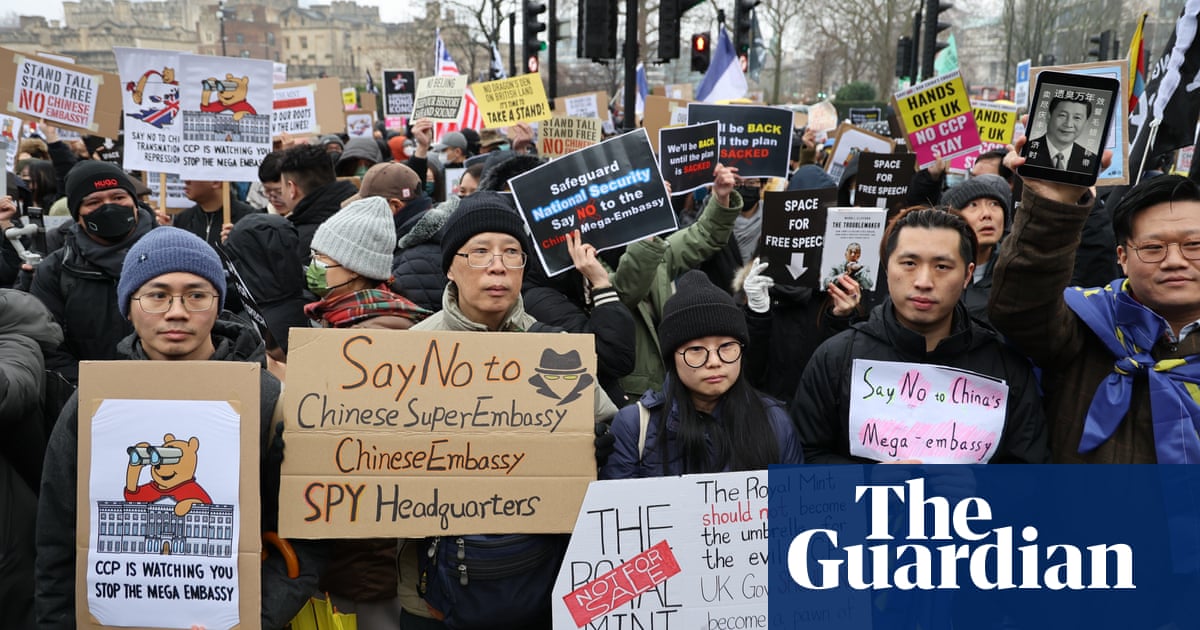Saaed Salem’s eyes filled with tears as he surveyed the remains of his north Gaza neighbourhood on a freezing February morning. He was resting in a chair that had somehow survived the war, surrounded by grandchildren and rubble, his hope for the future and the ruins of his past.
His family had lost one home in 1948, when they fled Hirbiya village, now the site of Zikim kibbutz inside Israel, to escape shelling and reports of atrocities by Israeli forces.
“We locked our house, took the key, and walked toward Gaza, believing we’d return in a few days,” said Salem, who was then five. Waiting at the end of an exhausting trek was a new reality of tents and refugee camps and permanent exile in the north of the Gaza strip.
“When the truth became clear, that we had abandoned our homes and others had taken them, we wished a thousand times that we had stayed and faced death instead. The regret never left us.” He was one of about 700,000 Palestinians forced from their homes in the “Nakba”, or catastrophe, during the 1948 war surrounding the creation of Israel.
So when Israeli troops moved into Gaza in October 2023, more than seven decades later, Salem and his family defied orders for civilians to evacuate to the south of the strip. “We had sworn not to make that mistake again,” he said.
They stayed in north Gaza during the war, with about 400,000 others, even as a blockade within a blockade meant the north got even less aid than the south. A global watchdog warned of impending famine there last year.
“We endured famine, thirst, bombings, fear, everything. We lived among corpses, under ruins, eating food that wasn’t fit for animals. But we never left northern Gaza,” he said. “Each time the Israeli army ordered an evacuation before a ground invasion, I moved only to a nearby neighbourhood. And as soon as the invasion ended, I was the first to return.”
Barely a week after Salem got back, Donald Trump announced he wanted the US to “own” Gaza and resettle its Palestinian residents elsewhere, describing the enclave as an “unlucky place” that should be rebuilt as a “Riviera of the Middle East”.
His proposal sparked international outrage, a warning against ethnic cleansing from the UN secretary general, António Guterres, and disbelief among the people of Gaza, who somehow clung on in their homes over 15 months of war.
Salem lost more than 90 friends and relatives early in the war when an airstrike on his brother’s house killed everyone who had taken refuge there. He knows the dangers of staying in Gaza, particularly if a ceasefire doesn’t hold, but nothing could tempt or frighten him away now.
“We will not leave. We will not repeat the Nakba. We will not abandon Gaza as we abandoned Hirbiya. This time, we stay, no matter the cost.”
Israel launched its war on Gaza after Hamas launched cross-border attacks on 7 October 2023, killing about 1,200 people and taking a further 251 hostage.
In the 15 months that followed, more than 48,000 Palestinians were killed in Israeli attacks, including more than 13,000 children, and more than 111,000 injured, according to health authorities in the strip.
Nine out of 10 homes were damaged or destroyed, while over 90% of Gazans were displaced and permanently hungry. Hospitals were repeatedly attacked, crippling the healthcare system, and there was little access to clean water and sanitation.
One of Mazouza Abu Hindi’s sons was among the dead, after he was killed trying to find food and firewood for his family. The other son has vanished into Israeli detention. Her home was among the buildings levelled by Israeli attacks.
Photograph: Enas Tantesh/The Observer
For now, she shares a burned-out school classroom with three daughters, with tattered cloth stretched over the empty window frames in a vain attempt to keep the rain and wind off the mattresses where her grandchildren sleep. It is their tenth shelter since the war began, and at 60 Abu Hindi looks so thin and fragile it seems almost impossible she survived the deprivations of the war.
after newsletter promotion
The family fled back and forth for 15 months across the north trying to escape Israeli offensives as food dwindled. “We lived like animals. We ate poultry and rabbit feed,” she says.
Now they get bread and rice from aid groups, but it is not always enough. She wakes up at around 5am to pray, although there are no mosques or call to prayer, because they were all destroyed. The children start to get up an hour later, filling the school with noise. If they have food she makes breakfast. If not, just tea.
Much of her energy goes into looking after the children. “Yesterday I found my six-year-old grandson crying next to his father’s grave. Money and possessions can be replaced, but who will compensate us for the souls we’ve lost?” Abu Hindi said.
But like Salem, she would rather struggle on here than take up Trump’s vague offer of a new home in exile. “I completely reject his idea to displace us. If he wants to rebuild Gaza, let him build it, and we will stay here.”
At the start of the war Khaldiyah Al-Shanbari had three sisters and a home. Now she lives in a blackened shell of a classroom with her one surviving sister, confined to a wheelchair after her legs were badly burned in an Israeli attack on another school where they had taken shelter.
She cooks on a small fire in the classroom, adding layers of soot to walls and ceilings blackened by war. There are no windows or doors, and she worries that even this basic shelter may be taken from them.
“Schools are reopening for students, but if we are forced out, we have nowhere left to go,” she said.
Their home and everything they own is gone. She has planted herbs and vegetables in the ruins, hoping that will give them something to eat, but finding water is a struggle. She walks long distances to fetch containers, and has injured her back carrying the loads. The nights are freezing, pitch dark, and terrifying. “I don’t sleep,” she said. “I just want the life we had before the war. Fear haunts me. What if the war starts again?
Despite the grief, the loss and the daily exhaustion of life in what Trump calls a demolition zone, Al Shanbari is determined to stay. “Neither he nor anyone else can wipe us out,” she said. “When people fled south, we never left northern Gaza, even through our hardest struggles.”
“For two years, we have endured hunger, bombings, and loss, but we are still here. We will endure until this nightmare ends.”
Article by:Source: Malak A Tantesh in Gaza and Emma Graham-Harrison in Jerusalem















